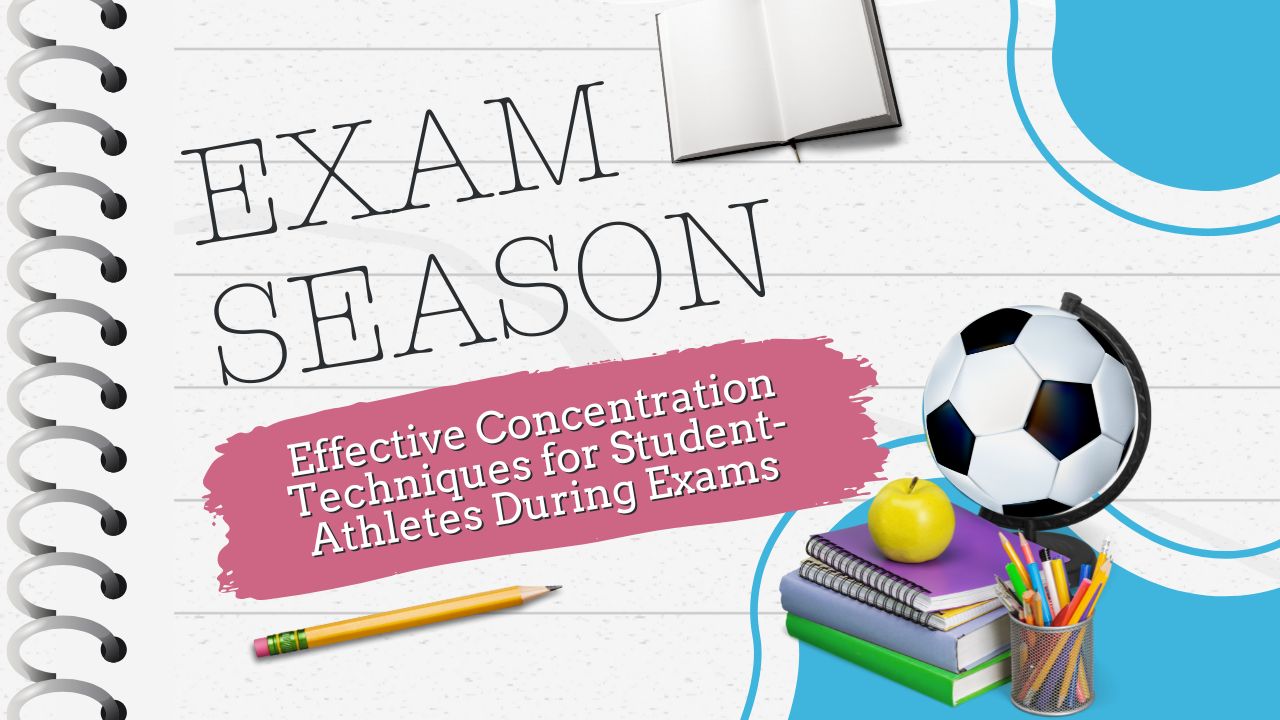For student-athletes, maintaining focus during exams isn’t just about hitting the books—it’s about translating the same mental discipline used on the field into the classroom. Between packed practice schedules, game-day pressure, and travel demands, finding and sustaining concentration can be tough. But just like training muscles, building focus is something you can work on with the right techniques.
Here’s a breakdown of the most effective, research-backed concentration strategies that student-athletes can use to stay sharp and lock in during exam week.
Mindfulness and Breathing: Train the Mental Game
Mindfulness Drills
Student-athletes are no strangers to pre-game focus. That same presence of mind applies to exams. Practicing mindfulness—even just five minutes a day—can anchor your attention. Try this: Sit still, close your eyes, and focus on your breath or the feeling of your hands on the desk. If your mind wanders, bring it back without judgment.
Controlled Breathing
Use the 4-6 breathing technique: Inhale for four counts, exhale for six. This simple exercise calms your nervous system and clears the mental clutter. It’s the same tactic elite athletes use during high-pressure moments.
Self-Talk and Visualization: Think Like a Winner
Positive Self-Talk
Athletes use self-talk to push through exhaustion. Why not use it to push through mental blocks? Instead of saying “I’m going to fail this exam,” try “I’ve prepared for this. I know the material. I’ve handled bigger pressure.”
Visualization Techniques
Just like athletes visualize a perfect play, visualize yourself calmly walking into the test, confidently answering questions, and finishing strong. Research shows that mental rehearsal primes the brain for actual performance—academic or athletic.
Active Learning: Go Beyond the Books
Retrieval Practice
Put the notes down. Ask yourself questions instead. Retrieval practice strengthens memory and improves focus better than rereading or highlighting.
Pomodoro Technique
Use the “Pomodoro” method: 25 minutes of intense studying, followed by a 5-minute break. After four cycles, take a longer 15–30 minute break. This rhythm helps prevent mental fatigue and keeps you in the zone.
Spaced Repetition
Don’t cram. Study small sections over time. Spacing out your sessions forces your brain to recall info, which improves long-term retention and attention span.
Study Environment: Set the Stage for Focus
Create a Distraction-Free Zone
Where you study matters. Avoid places associated with sleep or entertainment. Turn your phone on Do Not Disturb or use apps like Forest or Freedom to block distractions.
Study Playlists or White Noise
Instrumental music or ambient noise can help keep your mind from wandering. Bonus points for creating a “study-only” playlist to cue your brain into focus mode.
Movement, Nutrition, and Breaks: Support Your Body to Focus Your Mind
Active Breaks
Between study sessions, do 5–10 minutes of light activity—jumping jacks, stretching, a quick walk. It boosts blood flow and wakes up your brain.
Hydration + Nutrition
Dehydration is a concentration killer. Keep a water bottle nearby. Fuel your brain with complex carbs, healthy fats, and protein—skip the energy drinks and sugar bombs.
Microsessions: Maximize Your Gaps
Use the small gaps in your schedule—between classes, during warm-up cooldowns, or while traveling—to review flashcards or quiz yourself. These micro-reps keep your brain engaged and ready to focus when it’s time to go all-in.
Create Pre-Study Rituals
Just like athletes have pre-game routines, you should have a consistent pre-study ritual. Light a candle, play the same instrumental song, review your goals—anything that cues your brain it’s time to focus.
Athletes are built to focus. You’ve trained your mind to ignore the crowd, silence distractions, and execute under pressure. Those same skills apply when you open your exam booklet.
By building habits around mindfulness, active learning, strategic breaks, and environment control, student-athletes can not only survive exam week—but dominate it. Concentration isn’t just a skill. It’s part of the game.
Q: What’s the best time of day to study for student-athletes?
A: Study when you’re most alert—usually mid-morning or early evening. Avoid late-night cramming after training.
Q: Can exercise before studying help with focus?
A: Yes. Light cardio before study can increase dopamine and improve attention span and memory.
Q: What if I can’t find a quiet study space?
A: Use noise-canceling headphones or play white noise. Even public spaces can work if you block distractions.












